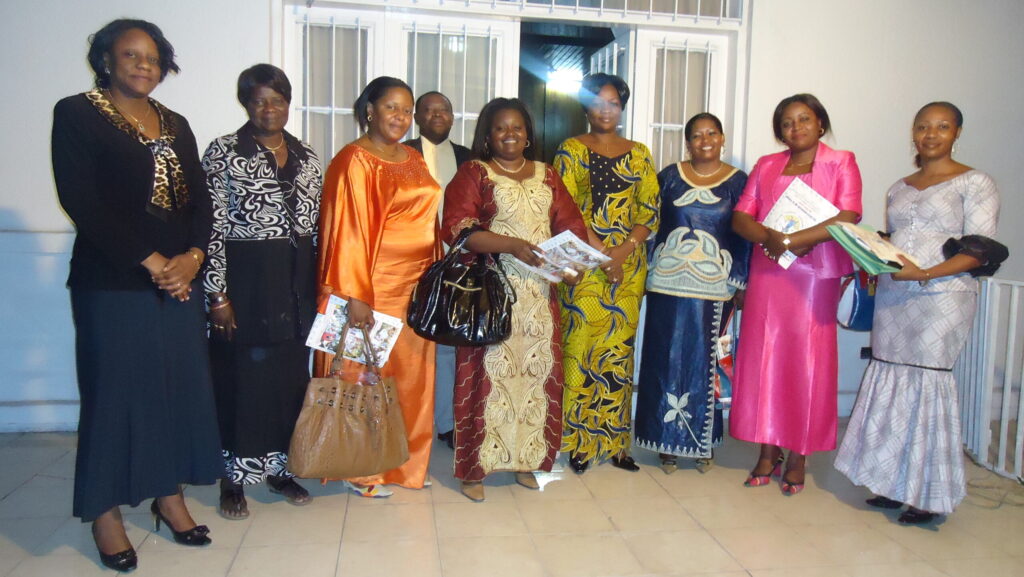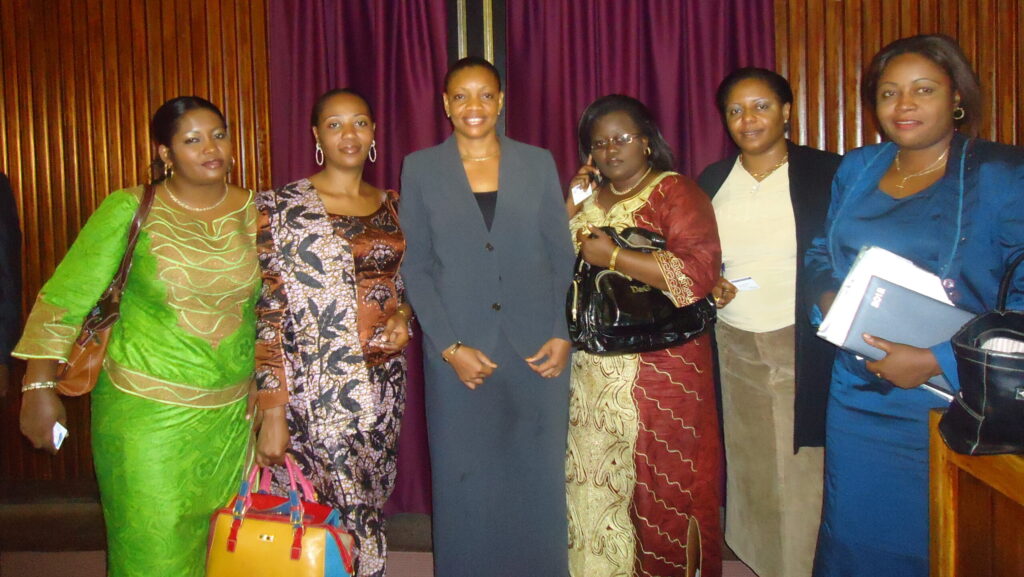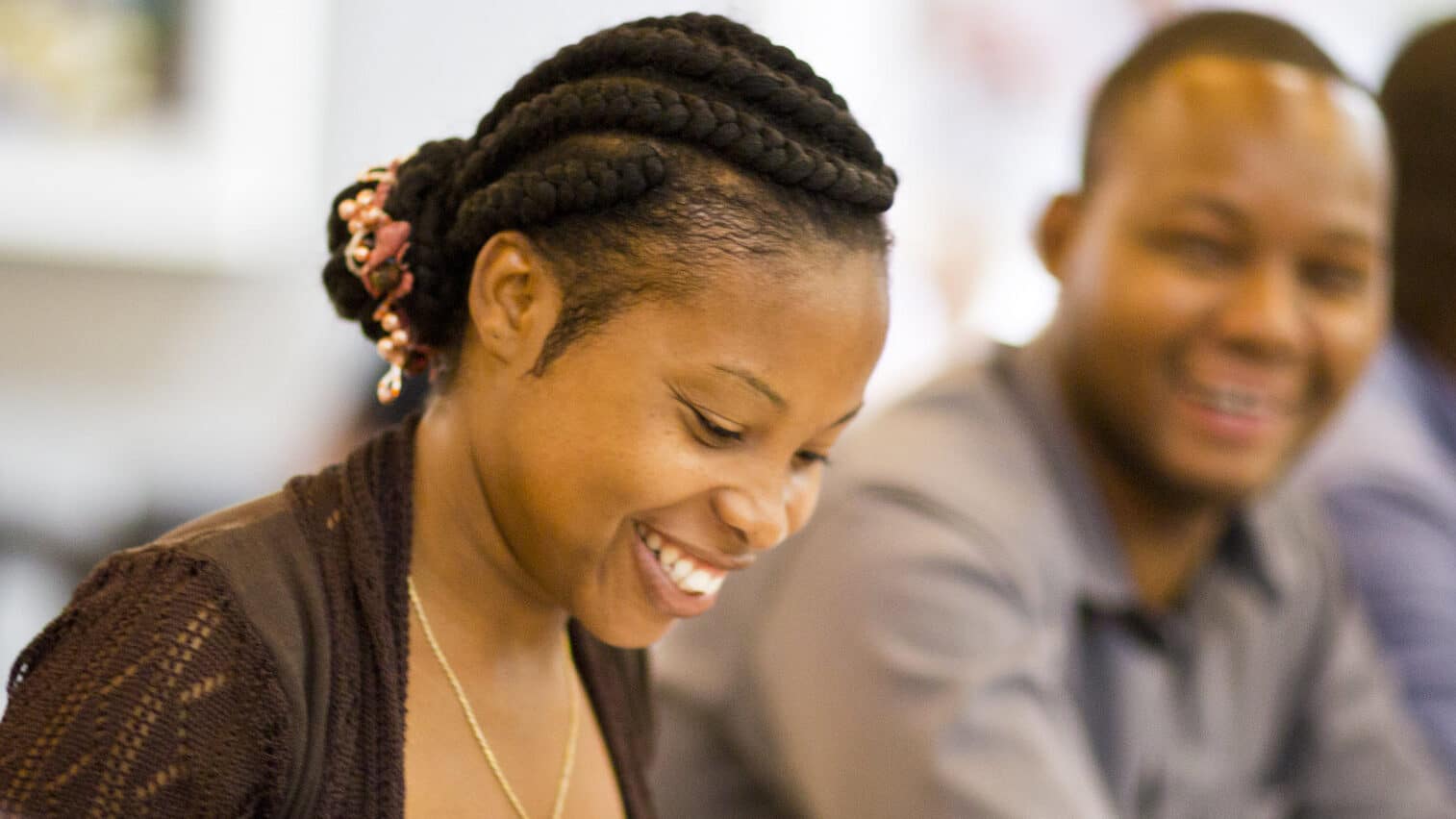In the Democratic Republic of Congo, married women have long been treated as legal minors under the tutelage of their husbands. Recent legal reforms have put gender equality on the map and granted more equal rights to Congolese women. Implementing the new laws, however, remains a major task.
The Democratic Republic of Congo has become more gender equal over the past years – at least in law, and slowly also in practice. Since 2015, a new Law on Parity promotes women’s participation in all sectors of society and since 2016, a revised Family Code grants Congolese women the right to freely decide how they choose to earn their living. “Women are now equal to men before the law, before they needed the permission of their husbands to have a job, open a bank account, or start a company,” says Claudine Tsongo, spokesperson of Dynamique des Femmes Juristes (DFJ), a local NGO of women lawyers. The ICR Facility spoke with Tsongo about the recent reforms to learn what made them successful. The Congolese lawyer has been lobbying for women’s rights in the Democratic Republic of Congo for almost 20 years, and strives to provide access to justice for women and children. With the new legislation, she says, many of the legal barriers to women’s economic inclusion have vanished.
Women’s participation in the economy is needed in the Democratic Republic of Congo. The country, which has experienced decades of conflict, remains among the poorest in the world. Around two-thirds of the population live in extreme poverty. On the Human Development Index, the country ranks among the last 15 out of the listed 191 countries[1]. Within this bigger picture, women are even further disadvantaged. Only ten percent of all Congolese women receive a regular salary, and those who work self-employed do so mostly in the informal and low-productivity sector.[2]
The prejudices faced by women are also reflected in a lack of inclusion into the financial system. Only 24 percent of Congolese women own a bank account.[3] And when it comes to women entrepreneurship, women borrow and invest much less than men: only 3.6 percent of all women-led companies even service a bank loan – and the loans that are served by women are on average 43 percent smaller than those owned by male entrepreneurs. In addition to legal obstacles, this low rate can also be explained by a low level of business training and financial literacy.[4] Overall, capital investments in the manufacturing sector are 77 percent higher for male-owned firms than for female-owned firms.[5]
Formerly, women needed their husband’s signature for any legal contract
Still, the country has come a long way regarding women’s rights. Women have long been treated as legal minors that have to obey to their husbands. The old Family Code, which had entered into force in 1987, recognised the husband as the head of the family, who holds “marital power” and owns all marital property, including the property of his wife. Women needed to ask their husbands for authorisation for all legal acts. Without his permission, they could not get a job, nor go to court or register land or enterprises.[6]
In 2006, a new Constitution recognised gender equality and equal representation, and stipulated the elimination of discrimination against women. This paved the way for a comprehensive reform process coordinated by the Ministry of Gender, Family and Children, which led to the Law on Parity in 2015, and the revision of the Family Code in 2016.[7]
Three success factors were crucial for the reforms
According to a WORLD BANK STUDY, three success factors were crucial for bringing about these reforms. First, several “gender champions” strongly pushed for them. Stakeholders from civil society such as women’s rights activists, church and community leaders, formed a powerful coalition which was backed by visible political leaders.[8] DJF was among the most prominent civil advocates for women’s rights. “We consulted with communities, collected petitions, and lobbied to influential politicians in Parliament and within the government to find allies,” says Claudine Tsongo.
As a second factor, advocates made the economic case for gender reforms and showed its positive impact on the economy and business environment, based on data provided by the international community. The data was crucial to show the male dominated political decision-makers that the country is falling short on development potential by discriminating women and leaving them behind.[9] Data from neighboring Benin, Burkina Faso and Togo proved that similar reforms had led to positive economic outcomes.
And as a third factor, international obligations pushed forward the cause in the Democratic Republic of Congo. Although the country has ratified the UNITED NATIONS CONVENTION ON THE ELIMINATION OF ALL FORMS OF DISCRIMINATION AGAINST WOMEN OF 1979 in 1985, it didn’t make any changes to its family law. The COMMITTEE ON THE ELIMINATION OF DISCRIMINATION AGAINST WOMEN reminded the DR Congo about its international obligations in each review, until finally the first reform bill was drafted in 2013 and then passed in 2016.[10]
Employers are instructed to grant women full legal capacity
How far the country has come in advancing women’s rights, is reflected by its score on the WORLD BANK’S WOMEN, BUSINESS AND THE LAW INDEX. While in 2015, it still scored 42.5 on the index, by 2023 this number has sharply risen to 78.8 – DRC now stands alongside some far more developed countries in terms of gender equality.[11] Still, women’s right activists had to strategically prioritize and drop some of their further-reaching demands to get to this point. Especially, challenging the traditional position of the husband as the designated head of household ran into a brick wall with conservative forces bringing up religious arguments.[12] As the legally recognized head of the household, the husband today still holds the authority to administer the joint marital property in the DRC, making it harder for women to obtain loans from banks to start or grow their business, because property is often required as a collateral.[13]
Despite the remaining gaps, the reality for women is gradually starting to change, thanks to the new laws. For example, the Law on Parity guarantees nondiscrimination for women explicitly in regard to access to credit.[14] Thus, many banks have begun to give out loans to women without the husband’s signature.[15] Moreover, the national Federation of Enterprises, an influential business organization, instructed all employers to grant women full legal capacity without their husband’s interference. Civil society organizations like DFJ organized communication campaigns to enlighten communities and women about their new rights. “We informed them what concrete change it meant for them, including what they can now claim in court based on the law,” says Claudine Tsongo.
Violations of the laws are still hardly sanctioned
However, there is also still a lot to do. Every day, banks still ignore the new rules and stick to old conventions, especially in rural areas.[16] Up to date, there is no redress mechanism to sanction violations of the equal access to credit.[17] Especially in rural areas, many people are not aware of the new laws, partly because they are disseminated only in French, not in the other four national languages. In addition, civil servants are hardly trained to implement the new rules. A World Bank project backing the implementation of the revised Family Code has demonstrated that offering capacity development to credit officers can make a change, as can campaigns showcasing successful women entrepreneurs.[18]
In the meantime, cultural beliefs remain a major obstacle to real gender equality in DRC. In a 2018 study, 91.4 percent of interviewed women and 83 percent of interviewed men agreed to the statement that “a woman’s most important role is to take care of her home and cook for her family”.[19] In addition, the lack of female political representation in politics stands in the way of enforcing the new laws and making gender equality the new reality. Currently, women only hold about 7 percent of positions at the highest level of decision-making.[20] “There is still a lot of work to be done, we are running advocacy and communication campaigns with every election and continue to press for equality,” says Claudine Tsongo. Reaching a 50:50 representation of men and women in politics seems out of reach at the moment, so the demands of the women’s rights activists focus around a 30 percent objective for now.[21]
Even if it remains a Herculean task to make gender equality the new normal in the Democratic Republic of Congo, step by step the country is getting closer to a more inclusive business environment – so women can fully enjoy their rights, access new opportunities and contribute to the economic development and resilience of their country, just as men can.
ICR Stories of Women Economic Empowerment
The ICR Stories of WOMEN ECONOMIC EMPOWERMENT portray business environment reforms that are benefiting women. If your organization also works to improve the laws and regulations to the benefit of women in the economy, you may be eligible for support by the ICR facility.
At the ICR Facility, we support organisations in Africa, Caribbean and Pacific (ACP) countries to improve their business environment, so that women can thrive as workers, entrepreneurs and investors. Upon request, we can support you to get through different stages of a policy reform – from the initial ideas to actual implementation. Our specialists provide expertise and help you to set up a dialogue between the government and the private sector – to make sure that all relevant voices are heard. Every request is different. We listen and adapt according to your needs. Tell us what you need. We can work on it together.


This publication is part of an intervention supported by the Investment Climate Reform (ICR) Facility. The ICR Facility is co-funded by the European Union (EU), the Organisation of African, Caribbean and Pacific States (OACPS) under the 11th European Development Fund (EDF), the German Federal Ministry for Economic Cooperation and Development (BMZ) and the British Council. The ICR Facility is implemented by GIZ, the British Council, Expertise France, and SNV. The contents of this publication are the sole responsibility of the author and do not necessarily reflect the views of the donors or the implementing partners.
[1] UNDP (2021/2022). Human Development Report. Available via: https://hdr.undp.org/system/files/documents/global-report-document/hdr2021-22pdf_1.pdf _gl=1%2A198age%2A_ga%2ANTI4MDE3MjU3LjE2ODcxNzkwNDM.%2A_ga_3W7LPK0WP1%2AMTY4NzM1NjA0OS4xLjEuMTY4NzM1NjA4NC4yNS4wLjA
[2] https://documents1.worldbank.org/curated/en/857041647271462384/pdf/Reforms-to-Enhance-Gender-Equality-in-the-Democratic-Republic-of-Congo-From-Advocacy-to-Implementation.pdf, p. 2
[3] https://data.worldbank.org/indicator/FX.OWN.TOTL.YG.ZS?locations=CG
[4] The World Bank: Empowering Women Entrepreneurs and Upgrading MSMEs for Economic Transformation and Jobs in DRC (P178176), p. 6
[5] https://documents1.worldbank.org/curated/en/501971553025918098/pdf/Main-Report.pdf, p- 69
[6] https://documents1.worldbank.org/curated/en/857041647271462384/pdf/Reforms-to-Enhance-Gender-Equality-in-the-Democratic-Republic-of-Congo-From-Advocacy-to-Implementation.pdf, p. 1; see also https://documents1.worldbank.org/curated/en/501971553025918098/pdf/Main-Report.pdf, p. 139
[7] https://www.jica.go.jp/english/our_work/thematic_issues/gender/background/c8h0vm0000anjqj6-att/drc_2017.pdf, p. 24
[8] https://www.jica.go.jp/english/our_work/thematic_issues/gender/background/c8h0vm0000anjqj6-att/drc_2017.pdf, p.24
[9] https://documents1.worldbank.org/curated/en/857041647271462384/pdf/Reforms-to-Enhance-Gender-Equality-in-the-Democratic-Republic-of-Congo-From-Advocacy-to-Implementation.pdf, p. 3
[10] https://tbinternet.ohchr.org/_layouts/15/TreatyBodyExternal/Treaty.aspx?CountryID=48&Lang=en
[11] https://donnees.banquemondiale.org/indicateur/SG.LAW.INDX?end=2021&locations=CD&start=2006
[12] https://documents1.worldbank.org/curated/en/857041647271462384/pdf/Reforms-to-Enhance-Gender-Equality-in-the-Democratic-Republic-of-Congo-From-Advocacy-to-Implementation.pdf, p. 3
[13] https://documents1.worldbank.org/curated/en/501971553025918098/pdf/Main-Report.pdf, p. 82; https://documents1.worldbank.org/curated/en/501971553025918098/pdf/Main-Report.pdf p. 139
[14] https://documents1.worldbank.org/curated/en/857041647271462384/pdf/Reforms-to-Enhance-Gender-Equality-in-the-Democratic-Republic-of-Congo-From-Advocacy-to-Implementation.pdf, p.3
[15] The World Bank: Empowering Women Entrepreneurs and Upgrading MSMEs for Economic Transformation and Jobs in DRC (P178176), p. 6
[16] https://blogs.worldbank.org/developmenttalk/reforms-enhance-gender-equality-democratic-republic-congo-advocacy-implementation
[17] https://documents1.worldbank.org/curated/en/857041647271462384/pdf/Reforms-to-Enhance-Gender-Equality-in-the-Democratic-Republic-of-Congo-From-Advocacy-to-Implementation.pdf, p.5
[18] https://projects.worldbank.org/en/projects-operations/project-detail/P160806
[19] https://www.researchgate.net/publication/326456434_Prevalence_and_correlates_of_gender_inequitable_norms_among_young_church-going_women_and_men_in_Kinshasa_Democratic_Republic_of_Congo
[20] https://africa.unwomen.org/en/where-we-are/west-and-central-africa/democratic-republic-of-congo
[21] Personal interview, Ezra Kambale 12/22
